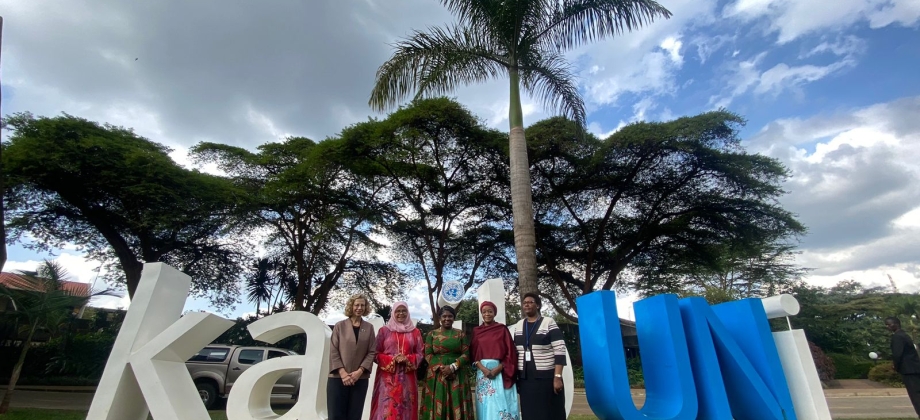Vicepresidenta Francia Márquez participó en el diálogo con lideresas del sistema de Naciones Unidas en Nairobi
Nairobi, mayo 16 de 2023 - @CancilleriaCol. Hoy, en el diálogo con lideresas del sistema de Naciones Unidas en Nairobi: Zainab Wangura, Directora General Oficina de Naciones en Nairobi; Maimunah Mohd Sharif, Directora Ejecutiva ONU-Hábitat e Inger Andersen, Directora Ejecutiva del PNUMA. La Oficina de las Naciones Unidas en Nairobi es la única sede de la ONU en el Sur Global. Es la sede de las Naciones Unidas en África y alberga los dos programas más importantes del sistema multilateral dedicados a cuestiones medioambientales y de asentamientos humanos, el PNUMA y ONU-Hábitat. Tras la Conferencia de las Naciones Unidas sobre el Medio Humano celebrada en Estocolmo en 1972 y el despliegue de una ambiciosa estrategia diplomática coordinada por Kenia, el PNUMA se trasladó al Centro de Conferencias Kenyatta en 1974, y a su ubicación actual en Gigiri en 1975, donde en 1978 se le unió ONU-Hábitat. El papel de la sede de Nairobi ha sido decisivo en la configuración de los contornos de la gobernanza medioambiental internacional.
A lo largo de las décadas, el PNUMA ha facilitado la creación de docenas de Acuerdos Multilaterales sobre Medio Ambiente (Minamata sobre el mercurio; Convenio de Montreal para la Protección de la Capa de Ozono; Convenios de Basilea, Rotterdam y Estocolmo sobre la contaminación; Convenio sobre el Tráfico Ilegal de Especies Amenazadas de Fauna y Flora Silvestres; Convenio sobre la Diversidad Biológica, Tratado Internacional para Acabar con la Contaminación por Plásticos, fomentando mayores sinergias entre los diferentes tratados ambientales mundiales, pero también promoviendo un enfoque más holístico, equitativo y justo para la aplicación de los compromisos ambientales mundiales.
ONU-Hábitat organiza el Foro Urbano Mundial y supervisa la implementación de la Nueva Agenda Urbana, el programa es el organismo custodio del ODS 11: "Hacer que las ciudades y las comunidades sean más inclusivas, seguras, resilientes y sostenibles". Gracias a la excelente gestión de su Directora Ejecutiva, el programa ha ido generando confianza y mejorando el porcentaje de contribuciones voluntarias. También se destaca la ventaja comparativa de ONU-Hábitat de trabajar con las autoridades locales y a nivel comunitario. Durante su intervención, la Directora Ejecutiva de Hábitat mencionó el proyecto de resolución presentado por Colombia junto a Costa Rica sobre Ciudades Biodiversas y Resilientes, que será negociada para adopción durante la Segunda Asamblea de Hábitat que se celebrará del 5 al 9 de junio en Nairobi y en la que se espera la participación de más de 50 ministros de vivienda y autoridades territoriales.
Durante el diálogo se resaltó el papel de las voces del Sur Global y de Nairobi para la gobernanza ambiental y para el fomento de acciones tangibles para alcanzar los objetivos fijados en estos escenarios intergubernamentales.
In english
HIGH-LEVEL WOMEN LEADERSHIP DIALOGUE WITH UN SYSTEM HEAD IN NAIROBI, VICEPRESIDENT FRANCIA MÁRQUEZ
Today, at the dialogue with women leaders of the United Nations system in Nairobi: Zainab Wangura, Director General United Nations Office at Nairobi; Maimunah Mohd Sharif, Executive Director of UN-Habitat and Inger Andersen, Executive Director of UNEP, moderated by Ambassador Rose Makena, Kenya Permanent Representative to UNEP and UNON.
The United Nations Office at Nairobi is the only UN headquarters in the Global South. It is the United Nations headquarters in Africa and hosts the two most important programs of the multilateral system dedicated to environmental and human settlements issues, UNEP and UN-Habitat.
Following the 1972 United Nations Conference on the Human Environment held in Stockholm and the deployment of an ambitious diplomatic strategy coordinated by Kenya, UNEP moved to the Kenyatta Conference Center in 1974, and to its current location in Gigiri in 1975, where it was joined in 1978 by UN-Habitat.
The role of the Nairobi HQ has been critical in shaping the contours of the international environmental governance.
Over the decades, UNEP has facilitated the creation of dozens of global Multilateral Environmental Agreements (MEAs: 1 Minamata on mercury; Montreal Convention for the Protection of the Ozone Layer; Basel, Rotterdam and Stockholm Conventions on pollution; Convention on Illegal Trafficking in Endangered Species of Wild Fauna and Flora; Convention on Biological Diversity, International Treaty to End Plastic Pollution. For a full list of UNEP hosted MEAs see: https://www.unep.org/about-un-environment/why-does-un-environment-matter/secretariats-and…), promoting greater synergies among the different global environmental treaties but also promoting a more holistic, equitable and just approach to the implementation of global environmental commitments.
UN-Habitat organize the World Urban Forum and oversees the implementation of the New Urban Agenda, the program is the custodian agency of SDG 11: "Make cities and communities more inclusive, safe, resilient and sustainable". Thanks to the excellent management of its Executive Director, the program has been building trust and improving the percentage of voluntary contributions. UN-Habitat's comparative advantage of working with local authorities and at the community level is also highlighted. On her round of responses, the Executive Director of Habitat mentioned the draft resolution presented by Colombia together with Costa Rica on Biodiverse and Resilient Cities, which will be negotiated for adoption during the Second Habitat Assembly to be held from June 5 to 9 in Nairobi, with the expected participation of more than 50 housing ministers and territorial authorities.
A call for an inclusive, sustainable, and effective multilateralism in times of global crises has never been more necessary. The Vicepresident of the Republic of Colombia, the Director General of UNON, the Executive Directors of UNEP and UN-Habitat participated in a dialogue which aimed to highlight the role of the voices of the Global South and Nairobi for the environmental governance and encourage tangible actions to achieve the goals set in the intergovernmental scenario.




